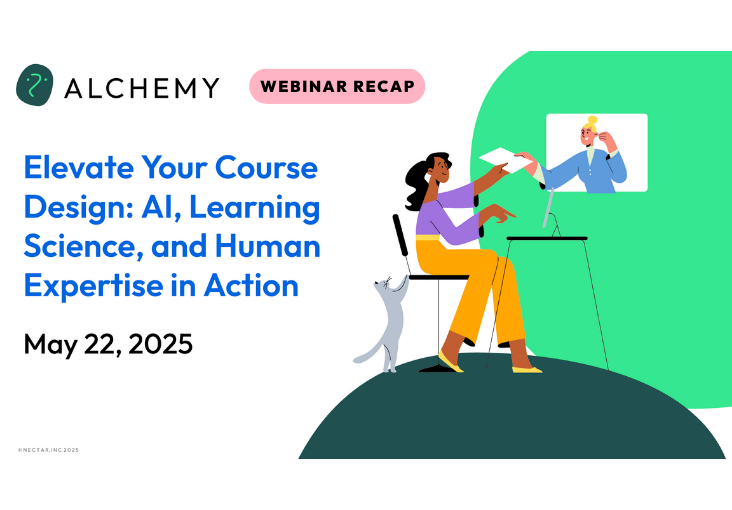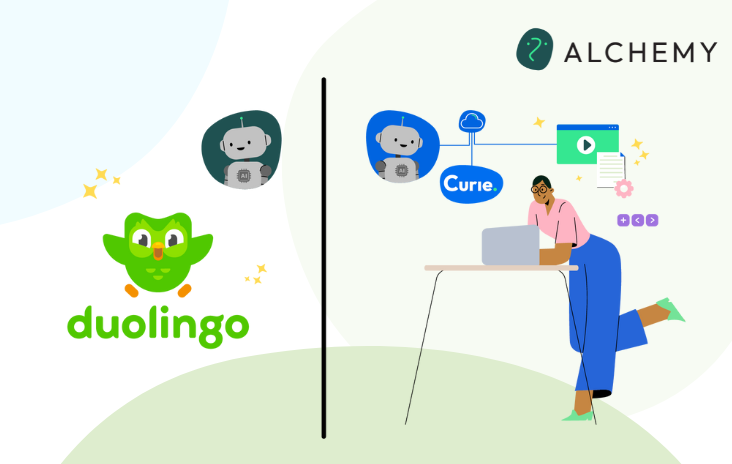Article
From Ideation to Publication: A Use Case for AI to Support Ethical Research

On March 26, 2025, Alchemy hosted a dynamic session titled AI for Academic Research: Balancing Innovation & Integrity. The webinar was co-facilitated by Tracy Mendolia, Ph.D., Associate Director of the Center for Teaching and Learning Excellence at Embry-Riddle Aeronautical University, and Brett Christie, Ph.D., VP of Educational Innovations & Inclusivity at Alchemy.
The session brought together faculty, faculty developers, and campus leaders from across the country to explore how generative AI is reshaping the research process. While we covered a range of strategies and institutional considerations, a central feature of the webinar was a case story that humanized the possibilities and ethical guardrails of AI-assisted research: the journey of Dr. Anna Patel.
Meet Dr. Patel: A Researcher Navigating AI with Intention
Dr. Anna Patel is a fictional Assistant Professor of Psychology at a mid-sized university, created as a persona to humanize and illustrate an AI-supported research journey. Like many faculty at teaching-focused institutions, she balances a full course load, student mentoring, and a strong desire to remain research-active despite limited resources. Interested in the mental health impacts of social media, Dr. Patel turns to AI tools—not to shortcut the process, but to amplify what’s possible within her time and bandwidth.
Here’s how she navigates six key stages of her research journey, using AI to enhance productivity while upholding scholarly integrity.
1. Ideation: Finding the Right Research Question
Dr. Patel begins with a broad topic: the influence of social media on mental health among university athletes. To help narrow her focus, she uses the following prompt in HyperWrite:
“For the topic of social media and mental health, formulate a research question that addresses a gap in current knowledge.”
The AI responds with several angles—one of which focuses on short-form video content and emotional regulation in student-athletes. Intrigued, Dr. Patel cross-references the suggestion with current literature to ensure originality and alignment with her field.
Ethical Watchpoint: Even when AI tools provide citation-backed results, researchers should critically assess the relevance, credibility, and context of any suggested sources before proceeding.
2. Literature Review: Organizing the Evidence
Next, Dr. Patel turns to AI tools built for scholarly research. Using platforms like Scite, Elicit, or ResearchRabbit allows her to identify peer-reviewed sources and maps the network of related research sources. These tools help visualize gaps and connections across studies.
But she doesn’t stop at summaries. Dr. Patel still reads each paper thoroughly to ensure she interprets findings accurately and avoids the trap of misrepresented conclusions.
Ethical Watchpoint: AI-generated summaries can oversimplify or mischaracterize study results. Human judgment is still the core of academic rigor.
3. Survey Design: Creating Valid Instruments
To gather data, Dr. Patel designs a student-facing survey. She uses SurveyMonkey ‘Build with AI’ to assist with drafting initial questions—seeking items that measure self-esteem, emotional regulation, and social media habits. The AI offers solid starting points, but Dr. Patel carefully revises them, checking for bias and alignment with research ethics.
She also consults her institution’s IRB for approval, ensuring the use of AI in instrument development is transparently documented.
Ethical Watchpoint: While AI can aid efficiency, faculty must guard against biased language and always involve human oversight in data collection planning.
4. Data Analysis: Gaining Insights, Not Just Outputs
Once survey data is collected, Dr. Patel explores her results using AI tools like Vizly or Julius. These tools assist with cleaning data, running correlations, and even generating draft visualizations.
Still, she interprets results herself and verifies statistical output using traditional methods to ensure accuracy and context.
Ethical Watchpoint: AI-generated insights must be critically evaluated. Over-reliance can lead to errors or misinterpretation of results.
5. Writing & Citing: Enhancing Clarity and Credibility
As she drafts her paper, Dr. Patel uses ChatGPT Deep Research to improve phrasing and restructure dense paragraphs. She’s careful not to use AI to generate original content but rather to enhance clarity and coherence.
She includes a disclosure statement noting AI assistance for editing and brainstorming—acknowledging its role without overstating it.
Ethical Watchpoint: AI should never be a ghostwriter. Transparency in its use is a matter of scholarly integrity.
6. Peer Review & Final Adjustments: Simulating Feedback
Before submitting to a journal, Dr. Patel prompts MS Copilot to simulate a peer reviewer. The AI points out vague language, weak transitions, and areas needing stronger evidence—giving her useful input before seeking real peer review.
She also uses Editage to explore journal options that align with her topic and methodology.
Ethical Watchpoint: While AI feedback is helpful, it cannot replace formal peer review or editorial oversight.
Ethics and Empowerment Go Hand-in-Hand
Dr. Patel’s journey illustrates what’s possible when AI is used strategically, ethically, and reflectively. At no point does AI substitute for her expertise—it serves as a scaffold, enabling her to manage her research workload without compromising academic values.
This case resonated strongly with our webinar participants, many of whom saw themselves in Dr. Patel’s balancing act between teaching, research, and institutional limitations.
Want to See the Tools in Action?
The full webinar recording includes demonstration and discussion of the AI tools mentioned in Dr. Patel’s use case—at each step of the research process. Whether you’re a researcher, faculty developer, or campus leader, the session offers practical insights and examples you can take back to your institution.


